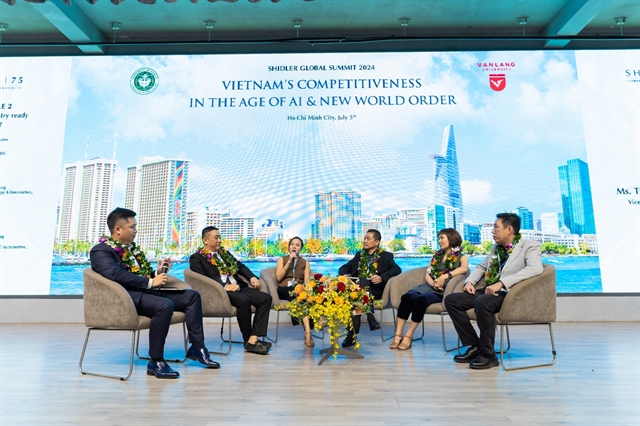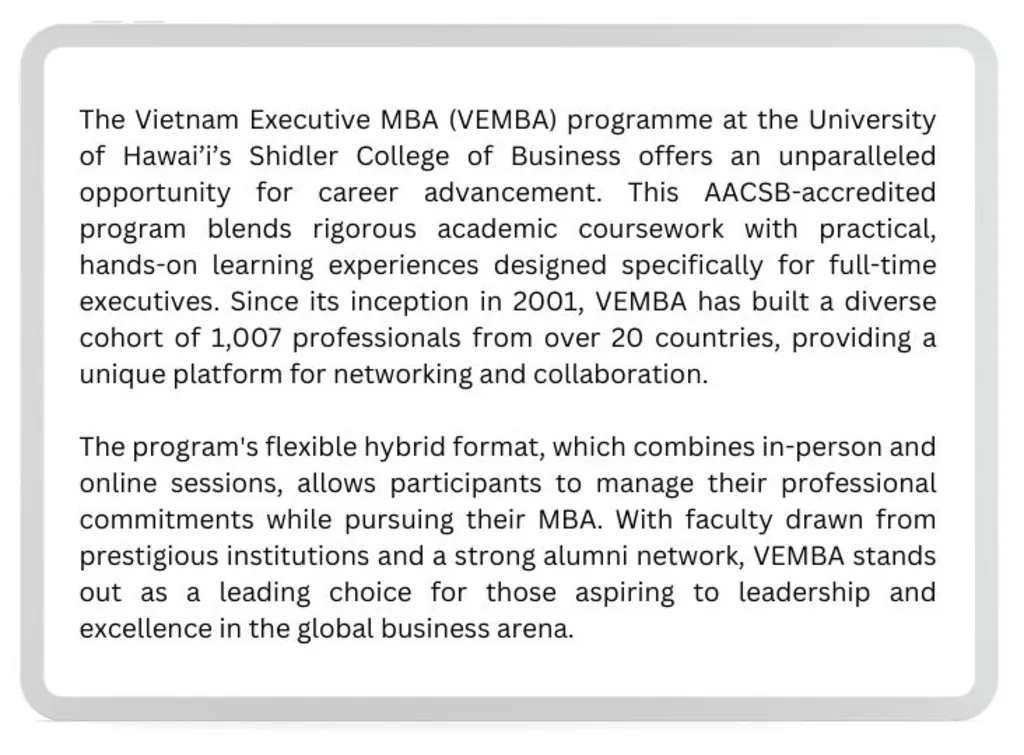 |
| The Shidler Global Leadership Summit being held in HCM City on July 5, where top leaders discussed prospects for generative AI. – Photo courtesy of Shidler College of Business |
HCM CITY – The adoption of AI applications, especially generative AI, is important for improving Việt Nam’s competitiveness in the global playing field, delegates told the Shidler Global Leadership Summit.
The summit was organised by the Shidler College of Business, the University of Hawai‘i at Mānoa, on July 5 at the Văn Lang University in Bình Thạnh District to discuss the impact and application of generative AI across many business sectors.
The event featured alumni of the Vietnam Executive MBA (VEMBA) programme at the Shidler College of Business currently holding leadership roles at major companies in Việt Nam.
Prof. Tùng Bùi, VEMBA faculty director & Matson Navigation Company chair of global business at Shidler, referred to the concept of a new world order in which there is rising competition between leading countries, which leads to changes in global supply chains, he told Việt Nam News.
 |
| Prof. Tùng Bùi, VEMBA faculty director & Matson Navigation Company chair of global business, Shidler, University of Hawaii at Mānoa. – Photo courtesy of Shidler College of Business |
Việt Nam could benefit from these changes as countries were reducing their reliance on China as a producer and instead seeking other partners like Việt Nam, India and Indonesia.
AI applications could help boost a country’s competitiveness in the global market, and Việt Nam could utilise these tools to further exploit its advantages, reduce costs and elevate its position to attract other countries.
For instance, they could help reduce operation costs in processes such as quality management and inventory management, rendering a production process smarter and more efficient.
They could also help with market research, analysing customer responses and even reduce the language and cultural barriers between Vietnamese businesses and other countries.
Generative AI was especially popular because for the first time ever humans could talk to computers and give orders (or prompts) on a conversational level instead of having to learn complicated computer programming languages.
Generative AI tools could also process a massive quantity of data at high speed.
To have AI applications assist in elevating one’s competitiveness in the context of the new world order, this context needed to be included in the training of the application.
They needed to understand the global context, one’s specific needs and challenges so that they could better help the user.
However, one had to be careful of pitfalls when utilising generative AI tools, such as accidently providing wrong answers that seemed reliable, misleading answers due to insufficient training data, incorrect assumptions made by the AI model, or biases in the data used to train it.
“An educated AI user must have sharp critical thinking and intuition.”
AI applications also needed to be fine-tuned for specific tasks.
Nguyễn Bá Quỳnh, senior vice president and head of APJ Market and VDC, Hitachi Digital Services, said for AI tools to be effective, data has to be accurate and stored properly so that their value could be extracted.
The right data platform, the right level of data management and knowledgeable people with strong ethics are important for digital transformation to be successful, he said.
Mai Linh Giang, CEO of the human resource development centre at VNPT Group, said AI tools could help improve labour productivity, utilising big data to help people in decision making, automate processes to reduce work time and create and provide new services or improve existing ones, he said.
With the help of AI tools, a company could improve customer service by utilising data gathered from customers from different services, which could be used to develop solutions and services.
Nguyễn Thị Trà My, Co-founder & Group CEO, The PAN Group, said the agricultural sector is also part of the AI trend as AI applications facilitate automation and efficient management of resources and improve productivity and quality, she said.
However, applying AI in agriculture is hindered by challenges related to data, investment and the workforce, she said.
“AI can be combined with the traditional experiences of farmers to create agricultural models that are sustainable, efficient and suitable to the real conditions.”
Proper collection and organisation of data allows AI tools to maintain and pass on these traditional experiences to future farmers, she said.
Regardless of technological advancement, close co-operation between the state, farmers, scientists, businesses, and consumers is still important, she added.
Experts from other fields discussed the use of AI in banking, healthcare, tourism, and others.
Leaders need change in mindset
Quỳnh said over the last 10 years there has been a big change in the image of Việt Nam on the global business arena as it became one of the top spots for high-quality workers in software development and engineering, who have been sought after by many companies in the US and Europe.
Young engineers are already adopting AI applications such as ChatGPT in their work, and a young labour workforce can in general adopt technology quickly.
However, according to experts at the event, many Vietnamese business leaders think technology innovation is either a waste of time or too risky, or they do not have capable internal personnel staff for these changes.
Helping the workforce adapt to these new changes, while important, is also challenging and requires a great deal of time.
Quỳnh said Việt Nam’s last 10 years of experience in technological development could not compare with superpowers’, and the country does not have enough top executives with hands-on experience in leading complex technology creation or implementation.
“In order for Việt Nam to catch up, we need to compare ourselves to advanced countries. We need business leaders to think of themselves as international citizens and not limit themselves to Việt Nam.
“Being a great entrepreneur or technologist in just Việt Nam is not enough. Current leaders have great responsibilities to foster the next generation of leaders.”
Giang said it is crucial for leaders to invest in employees and even in themselves to adapt to AI applications and new changes.
A case for AI
Nguyễn Thị Thùy Dương, vice president and chief revenue officer of FPT Automative – FPT Software, said while many businesses have been using AI chatbot customer services, some businesses are reluctant to use AI tools and many people fear that they would replace them.
It is harder to persuade staff in manufacturing businesses to adopt these tools, which means it is important to show them, through small tasks, how these tools can benefit them.
She pointed to the example of a business that uses cameras and AI applications to gather data on how its staff pick up their lunch in the canteen and analysing that data to help it improve its menus, reduce food wastage and increase staff satisfaction.
Successful examples of AI implementation can also nudge other businesses, she said, pointing to the Long Châu pharmacy store chain, which uses AI mentor tools to provide further training to new pharmacists, helping them learn every day in an easy manner, and uses AI to greatly enhance its inventory management to ensure customers have consistent access to products.
The growth of AI is inevitable, and so businesses need to find ways to use these tools to benefit them. – VNS
 |
| AI |
- Reduce Hair Loss with PURA D’OR Gold Label Shampoo
- Castor Oil Has Made a “Huge” Difference With Hair and Brow Growth
- Excessive hair loss in men: Signs of illness that cannot be subjective
- Dịch Vụ SEO Website ở Los Angeles, CA: đưa trang web doanh nghiệp bạn lên top Google
- Nails Salon Sierra Madre
 VnExpress News The News Gateway of Vietnam
VnExpress News The News Gateway of Vietnam




